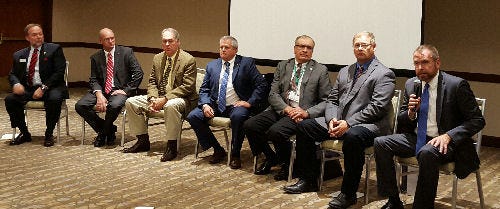Livestock and crop groups voice optimism and support to see trade deal advanced in Congress.

Agricultural livestock and commodity groups have not always seen eye-to-eye in recent years, but that was not the case Wednesday when top leaders joined together to rally for support for the recently negotiated Trans Pacific Partnership trade deal.
At a press conference at the National Association of Farm Broadcasters Trade Talk convention, groups were united in their praise for the positive agricultural impact TPP can bring as well as promises to do whatever it takes to get it passed by Congress. Group leaders from the pork, beef, soybean, corn, wheat and U.S. Grains Council also touted individual benefits to their sector.

Top agricultural leaders joined together to share the positive impact TPP could have on agriculture as a whole. Seated from left to right includes Brett Blankenship, president, National Assn. of Wheat Growers; Alan Tiemann, chairman, U.S. Grains Council; Bob McCan, immediate past president, National Cattlemen's Beef Assn.; Chip Bowling, president, National Corn Growers Assn.; John Weber, president-elect, National Pork Producers Assn.; Wade Cowan, president, American Soybean Assn. and Phil Karsting, administrator, Foreign Agricultural Service at USDA.
Brett Blakenship, president of the National Assn. of Wheat Growers, said it’s important to realize that no comprehensive trade agreement is perfect, but the question is whether U.S. agriculture would be better with it or without the deal in place. He said without a doubt U.S. agriculture is “way better with it” with greatly expanded market opportunities and the potential to add more in the key Pacific region.
The U.S. Department of Agriculture’s Economic Research Service estimates that TPP will result in a 6.6% increase in agricultural trade by 2025. This increase will account for an additional $8.5 billion in the agricultural marketplace, assuming the complete elimination of existing agricultural tariffs by 2025, said Ian Sheldon, Ohio State University international trade economist. Additionally, the ERS anticipates that the agreement will result in a 33% overall increase in U.S. exports and a 10% increase in imports by 2025.
Following the release of the full deal text Nov. 5, Senate Finance Committee chairman Orrin Hatch (R., Utah) said the deal’s provisions on intellectual property rights may require a renegotiation. “While I understand that parties have deemed the negotiations closed, the agreement cannot enter into force if Congress doesn’t agree to it. At the end of the day, [U.S. Trade Representative] may need to go back to the negotiating table and try again. That result is not ideal, but it is certainly not unprecedented,” Hatch said in a speech at the U.S. Chamber of Commerce.
Chip Bowling, president of the National Corn Growers Assn., warned that pulling one string out to renegotiate could unravel the carefully crafted deal that negotiators were able to reach. “It’s not just a simple manner of reopening the text. Every piece of that agreement is related to every other piece of that agreement,” he said.
Agriculture typically has had a strong sway in pulling trade deals across the finish line and the commodity leaders again expressed optimism that can be the case again. Blakenship said he’s optimistic the deal will get passed. Against the skeptics, 60 votes were obtained in the Senate on Trade Promotion Authority – which gave negotiators the final authority to negotiate a deal and send it to Congress for an up or down vote.
“This will be a heavy lift, but I think we’ll get it done,” Blakenship said.
“While no agreement is perfect,” said National Pork Producers Council president-elect John Weber, “the TPP is overwhelmingly beneficial to the United States, and members of Congress need to keep that in mind.”
Weber, as well as Bob McCan, immediate-past president for the National Cattlemen’s Beef Assn., both relayed concerns that their industries will lose market share in the region if TPP is delayed or not implemented. On the flip side, a growing demand for protein in the Asia region could provide an overwhelming increase in market opportunities for U.S. livestock producers.
“Pork producers across the country will do whatever it takes to get TPP passed by Congress and implemented. That’s a promise,” concluded Weber.
The spotlight now shifts to Congress, where the agreement faces a stiff political headwind, an issue that American Soybean Assn. president Wade Cowan said is significant but not insurmountable.
"We've seen climates like this before, complete with political polarization and the added stress of an election year, but even in those times, we've still managed to put together a coalition of industries and congressional allies to move beneficial packages through," Cowan said. "Trade Promotion Authority was no easy lift, but we found Democrats and Republicans alike that saw the distinct promise of trade for our businesses. That sensible, middle-ground coalition will be key to approving TPP as well, and we call on Congress to take up this effort and approve the Trans-Pacific Partnership as quickly as possible."
About the Author(s)
You May Also Like





